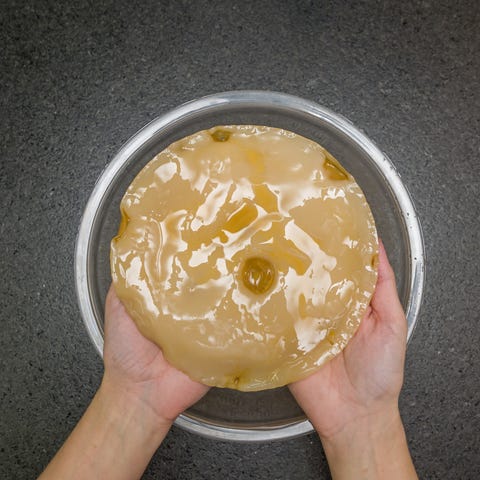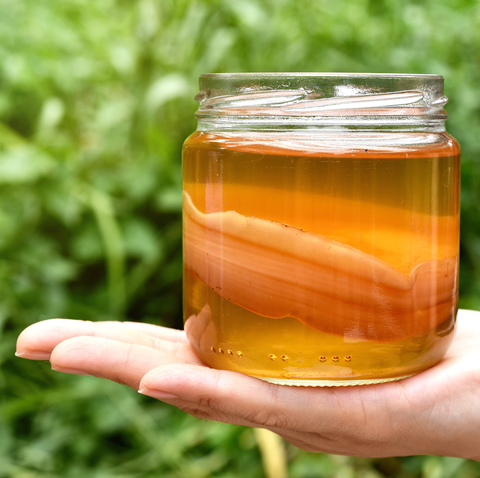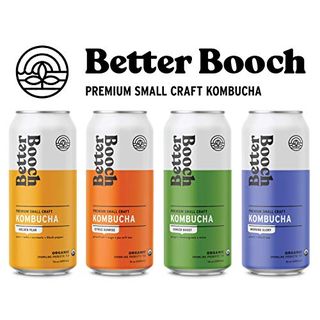We Ran Kombucha’s Gut Health Claims by a Gut Health Doctor
You’ve probably seen the trendy glass bottles of kombucha lining the refrigerator at your local health foods store. Touted by wellness gurus and so-called nutrition experts, kombucha (pronounced “kom-BOO-cha”) is supposed to help detox your body, fix all your gut health issues, and even help you lose weight.
But is this fermented fizzy potion really the miracle health elixir that it’s hyped to be? Or is it just another short-lived wellness trend?
First, it’s helpful to understand what kombucha actually is.
Kombucha is a fizzy tea, usually made with black or green tea, sugar, bacteria, and yeast. It has a slightly sour, almost vinegar-like taste, and is fermented for one to two weeks using a SCOBY, which stands for symbiotic culture of bacteria and yeast that is grown.
The SCOBY—which resembles a jelly-like pancake—sits at the top of the tea, feeding on the sugar and trapping in air, which causes the fermentation, explains Will Bulsiewicz, M.D., a gastroenterologist at Lowcountry Gastroenterology in Mount Pleasant, South Carolina.

Thiago Santos
“When you create kombucha, the bacteria and the yeast are taking that sugar and they are transforming it,” he says. “The fermentation process unlocks things in the food that you would normally not get access to.”
This includes probiotics, the bacteria and yeast that help grow the good-for-you bacteria in your gut, which may not only aid in digestion, but also play a role in how you process food, absorb nutrients, and how your metabolism and immune system function, says Dr. Bulsiewicz.
Kombucha typically contains about a billion or so probiotics. That sounds like a lot, but some probiotic supplements say they contain as many as 450 billion.

Randy Tarr Photography
That said, the drink can be good for your gut health, says Dr. Bulsiewicz, because it helps deliver the probiotics directly to your colon, unlike probiotics in pill form which may be killed off by your stomach acid.
Kombucha’s nutritional profile goes beyond probiotics, too, as it carries vitamins B1, B6, and B12, which help boost your immune system, regulate your mood, and produce red blood cells. You’ll also get some vitamin C, an antioxidant important for your skin, bones, and heart.
Can Kombucha Detox Your Body and Help You Lose Weight?
Even though kombucha contains beneficial nutrients, some of the health claims surrounding the drink are suspect. Many of the scientific studies regarding the health benefits of kombucha have been conducted on rodents, not humans.
But kombucha does have “detoxing” properties, just not in the way you might think.

Getty Images
Your liver already does a pretty good job of breaking down and flushing toxic substances from your body. Kombucha, on the other hand, may offer a slight health boost through its concentration of polyphenols, a type of antioxidant that can fight inflammation in your body. These antioxidants reduce your exposure to oxidation, a chemical process that damages your cells, which can eventually lead to things like heart disease, stroke, or even cancer, explains Dr. Bulsiewicz.
As for weight loss? There’s not enough research to support that kombucha can help you drop pounds, “although it is clear that a healthy balance of gut bacteria is needed to maintain a proper weight, and kombucha could contribute to a healthy balance of gut bacteria,” Dr. Bulsiewicz says.

Better Booch Kombucha
$47.99
BUY NOW
Kombucha can be beneficial for your waistline in other ways, too. The bubbly drink typically packs fewer calories and sugar than soda or juice, since a lot of the sugar gets lost in the fermentation process.
That said, be careful: some brands may add fruit juice, sugar, or stevia for taste, so check the label for those added ingredients. Ideally, you want to look for a kombucha with less than 6 grams of sugar per 8 ounces, Dr. Bulsiewicz recommends.
How Much Kombucha Should You Drink?
It’s also important to note that due to the fermentation process, kombucha does contain trace amounts of alcohol, about half a percent or less per serving.
“If you have a history of alcoholism, there is no safe amount of alcohol to consume,” Dr. Bulsiewicz explains. “So I would recommend people who have that history not go near kombucha.”

MichellePatrickPhotographyLLC
If you’re one of those people, opting for other fermented foods that don’t contain any alcohol, such as kimchi or sauerkraut, can be a better option since they still pack a good dose of probiotics.
If you’re drinking kombucha for the first time, Dr. Bulsiewicz recommends starting out with about four ounces per day to get your digestive system used to it. Some people who are particularly sensitive can have adverse reactions to kombucha, like diarrhea or bloating.
The same reaction can happen when you take antibiotics, eat other fermented foods, or take probiotic supplements, possibly because your immune system is reacting to the destruction of unhealthy bacteria, Dr. Bulsiewicz explains.
But once you increase your intake gradually and your body is comfortable with it, you can drink about eight to 12 ounces of kombucha per day. Any more than 16 ounces a day is overkill, says Dr. Bulsiewicz.
“You don’t want to make kombucha the backbone of your health,” he says. “This is not meant to be the thing that’s going to cure all your problems.”
It is, however, a great option when you want something healthy and fizzy to tame your soda craving.
We’ll drink to that.
Source: Read Full Article
